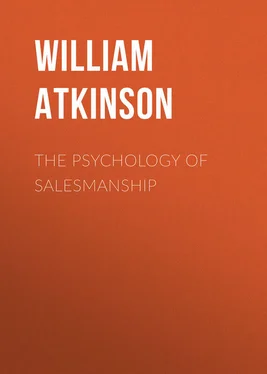William Atkinson - The Psychology of Salesmanship
Здесь есть возможность читать онлайн «William Atkinson - The Psychology of Salesmanship» — ознакомительный отрывок электронной книги совершенно бесплатно, а после прочтения отрывка купить полную версию. В некоторых случаях можно слушать аудио, скачать через торрент в формате fb2 и присутствует краткое содержание. ISBN: , Жанр: foreign_antique, foreign_prose, на английском языке. Описание произведения, (предисловие) а так же отзывы посетителей доступны на портале библиотеки ЛибКат.
- Название:The Psychology of Salesmanship
- Автор:
- Жанр:
- Год:неизвестен
- ISBN:http://www.gutenberg.org/ebooks/41510
- Рейтинг книги:5 / 5. Голосов: 1
-
Избранное:Добавить в избранное
- Отзывы:
-
Ваша оценка:
- 100
- 1
- 2
- 3
- 4
- 5
The Psychology of Salesmanship: краткое содержание, описание и аннотация
Предлагаем к чтению аннотацию, описание, краткое содержание или предисловие (зависит от того, что написал сам автор книги «The Psychology of Salesmanship»). Если вы не нашли необходимую информацию о книге — напишите в комментариях, мы постараемся отыскать её.
The Psychology of Salesmanship — читать онлайн ознакомительный отрывок
Ниже представлен текст книги, разбитый по страницам. Система сохранения места последней прочитанной страницы, позволяет с удобством читать онлайн бесплатно книгу «The Psychology of Salesmanship», без необходимости каждый раз заново искать на чём Вы остановились. Поставьте закладку, и сможете в любой момент перейти на страницу, на которой закончили чтение.
Интервал:
Закладка:
Dr. Herbert A. Parkyn, an authority on Suggestion, draws the following picture from life of a retail merchant who is suffering from the effect of adverse psychological influences resulting from his pessimistic mental attitude. The present writer can vouch for the accuracy of Dr. Parkyn's picture, for he knows the original of the sketch. Dr. Parkyn says of the storekeeper:
"He is the proprietor of a store in a neighboring city; but such a store – it almost gives me the blues to go into it! His windows are dressed year in and year out with the same old signs, and there is nothing to give the store the cheerful appearance so essential to an up-to-date business establishment. But the atmosphere of the place is only in keeping with the proprietor. When he started in business thirty years ago he employed eight clerks, but his business has fallen off till he does all the work himself and is scarcely able now to pay rent, although competitors around him are increasing their business steadily every year. In the course of a fifteen minute's conversation, the first time I met him, he told me all his troubles, which were many. According to his story, everyone had been trying to get the better of him ever since he started in business; his competitors resorted to unfair business methods; his landlord was endeavoring to drive him out by raising his rent; he could not get an honest clerk in his store; an old man had not an equal chance with a young man; he could not understand why people he had catered to so faithfully should be so ungrateful or so fickle as to give their patronage to every upstart who went into business in the same line as his; he supposed that he could work along, as he was doing, from morning till night without a holiday till he was driven to the poorhouse or died, and although he had been in the same stand for fifteen years there was not a single person he could call on if in need of a friend, etc. Although I have had occasion to visit him many times during business hours, I have never heard him address a cheerful or encouraging remark to a customer. On the other hand he waited on them, not only with an air of indifference, but apparently as if he were doing them a favor by allowing them to trade at his store, while others who dropped in to ask permission to use his telephone or to enquire about residents in the neighborhood were soon given to understand by his manner and answers that he considered them a nuisance and hoped they had not mistaken his store for an information bureau. I have purposely led him into other channels of conversation, with the same result; everything was going to the dogs – the city, the country, etc. No matter what was talked about, his remarks were saturated with pessimism. He was ready to blame everything and everyone for his condition, and when I ventured to suggest that much of his trouble was due to his attitude he was ready to show me to the door. * * * If he would but cast his bread upon the waters for a few weeks by bestowing a smile here and a smile there, or a cheerful encouraging word to this customer and that customer, he would certainly feel better for the giving, and they would return to him a thousand fold. If he would only assume that he is prosperous and proceed to give his store an air of prosperity, how much more attractive he could make his place look and how much more inviting it would be for customers! If he would assume that every person that entered his store was his guest, whether he made a purchase or not, people would feel like returning to his store when they wanted anything in his line. I could suggest a hundred ways in which this man could employ suggestion and auto-suggestion to increase his business, to draw friends to him, instead of driving them away, and to make the world and himself better and happier while he lives in it."
But, you may ask, what has all this to do with psychology in salesmanship – what has the matter of advertising, store display, personal manner, etc., to do with salesmanship? Just this much, that all these things are based on the same fundamental principles as is salesmanship, and that these fundamental principles are those of psychology. All that has been said refers to psychology – all is the effect of psychology pure and simple. All depends upon the mental attitude, the suggestions offered, the mental states induced, the motive to the will – all these outward things are merely the effects of inner mental states.
J.W. Kennedy, in "Judicious Advertising" says: "Advertising is just salesmanship on paper; a mere money-making means of selling goods rapidly. That 'mysterious something' is just printed persuasion and its other name is 'selling conviction.' Conviction can be imparted at will by those few writers who have closely studied the thought processes by which conviction is induced. The mission of every ad. is to convert readers into buyers." Geo. Dyers, in the same journal says: "Advertising takes into account the sub-conscious impressions, the varying phases of suggestion and association as received through the eye, the psychology of the direct command, – all worth earnest consideration, and seriously to be reckoned with, however we may balk at the terms." Seth Brown in "Salesmanship" says: "To make advertising which will sell goods requires development of the human part of the writer. He must realize the different forces which command Attention, Interest, Desire and Conviction. The buyer wants your goods because they will produce for him some definite effect or result. It is this result that the ad. man must keep in mind."
"But," you may also say, "after all this 'psychology' seems to be nothing else than what we have always known as 'human nature' – there is nothing new about this." Exactly so! Psychology is the inner science of human nature. Human nature depends entirely upon psychological processes – it is bound up with the activities of the mind. The study of human nature is the study of the minds of people. But whereas the study of human nature, as usually conducted, is a haphazard, hit-or-miss sort of undertaking, the study of the mind, according to the established principles of psychology, is of the nature of the study of science, and is pursued according to scientific methods.
Читать дальшеИнтервал:
Закладка:
Похожие книги на «The Psychology of Salesmanship»
Представляем Вашему вниманию похожие книги на «The Psychology of Salesmanship» списком для выбора. Мы отобрали схожую по названию и смыслу литературу в надежде предоставить читателям больше вариантов отыскать новые, интересные, ещё непрочитанные произведения.
Обсуждение, отзывы о книге «The Psychology of Salesmanship» и просто собственные мнения читателей. Оставьте ваши комментарии, напишите, что Вы думаете о произведении, его смысле или главных героях. Укажите что конкретно понравилось, а что нет, и почему Вы так считаете.












